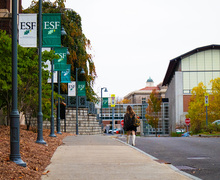SU policy prohibits faculty from dating undergrads, restricts professors’ relationships with grad students
The student’s eyes gaze into the professor’s across a packed lecture hall. His returning smile hints at a possible rendezvous after class. Both daydream of beginning a romantic relationship.
But if that daydream becomes reality, the professor risks more than a broken heart or one-night stand; he may face severe consequences, including the loss of his job, according to recent policies made at several universities.
‘It’s like a love affair gone bad,’ said Diane Murphy, chairwoman of the Committee of Academic Freedom, Tenure and Professional Ethics, of the consequences that accompany a relationship.
A new policy passed by the Regents of the University of California last July prohibits all professors and faculty from engaging in any sort of sexual or romantic relationship with their students. If any professor or faculty member violates this ban, the university will demand a letter of censure or a dismissal, according to a Los Angeles Times article.
While many people on campuses consider the idea of a staff-and-student intimate relationship as taboo, which prevents many relationships from forming, most colleges do not have an explicit policy regarding these relationships and any resulting consequences.
Ohio Wesleyan University, the College of William and Mary and Yale University each have relationship bans. Other schools, such as Syracuse University and Duke University, simply strongly urge school employees to avoid intimate relationships.
SU’s policy prohibits staff and faculty, including teaching assistants, from having intimate relationships with undergraduate students, but only strongly discourages these relationships with graduate students, according to the SU Faculty Manual Policies and Procedures.
‘I feel like I hear about this stuff going on all the time,’ said Jamie Podhaizer, a senior marketing and international relations major who knew of a friend her freshman year who had a relationship with a TA.
Podhaizer doesn’t think a new policy would change the reality of student-faculty relationships, because relationships already form under SU’s current policy.
‘There are people who feel strongly that that’s as far as we should go, and that we shouldn’t be trying to legislate morality,’ said Curlene Autrey, director of diversity and resolution processes in the Office of Human Resources. ‘But some people feel it doesn’t go far enough.’
Many universities change their policies after a specific incident of sexual harassment on their campus. The idea for the California ban became an urgent issue in the fall of 2002 after a law student claimed that her former law professor, John P. Dwyer, fondled her after she passed out from drinking, according to the LA Times article.
The case is similar to an incident at Syracuse University in 1995, when Jennifer Cotter, a graduate student studying English, claimed her professor, Stephen Dobyns, stared at her breasts, swore at her and threw his drink at her at an off-campus party, according to a Post-Standard article. The university suspended Dobyns, who admitted to his action but said it was not sexual harassment. He is no longer employed by the university.
When Murphy wrote SU’s policy in 1993, it was the only known policy of its kind at that time, Autrey said.
‘The sentiment in 1993 that would probably prevail today is that people have the right to relationships,’ Murphy said. ‘So we put in as many protections as we can, short of prohibition.’
If a consensual relationship develops, the authority figure in the relationship must report it to a supervisor to be monitored, Murphy said. The supervisor needs to ensure that the authority figure does not make recommendations for the student or treat the student any differently from anybody else he or she is overseeing. In many cases, the other person will be transferred from the authority figure’s care.
Many students joke about such intimate relationships, and may not consider their serious repercussions, which can range from favoritism to sexual harassment.
‘It’s often viewed as cute or interesting, but taken to the extreme, it can impact the student as well as other students,’ Autrey said.
The SU policy states that ‘those with authority not abuse, nor seem to abuse, the power with which they are entrusted.’ The student in the relationship is in a vulnerable position, and other students who become aware of the relationship may feel that that student will receive special treatment.
‘I think that having a relationship with a TA or professor totally interferes with that professional, educational scene,’ said Lauren Clingon, a sophomore biology major. ‘The bottom line is, teachers and students should stay in their respective roles.’
If a student complains about a relationship with a professor, he or she will not be at fault and face no consequences. But the university must step in and follow the steps of its sexual-harassment policy, which begins with an investigation team to determine whether the complaint could be a case of sexual harassment. A panel then investigates the case and recommends appropriate repercussions.
‘A consensual relationship only becomes an issue when one of the parties says it is not consensual, and then it becomes an issue of sexual harassment,’ Autrey said.
If the student begins sexually harassing the authority figure, the sexual-harassment policy procedure should apply in the same way, Autrey said. Yet it would be dangerous for the authority figure to complain, because he or she is publicly admitting that he or she was involved in a consensual relationship.
‘It’s very different because the student does not have the same power,’ Autrey said.
Six grievances have been filed since 1993, but all were settled before reaching an official hearing, Murphy said. Three of the cases involved graduate students, and had SU’s policy banned all forms of consensual relationships, those cases might not have arisen, she said.
‘It’d be a lot easier if we had outright prohibitions,’ Murphy said.
But an outright ban would force these relationships to go underground, where the university would have no control or responsibility to help the injured party, Autrey said.
‘They’re there to teach the kids,’ said Dave Gomez, a junior biochemistry major who also works in a BIO 121 lab as an assistant. ‘They shouldn’t cross that line.’
But Malusi Qhobosheane, an SU food service worker, said if two people believe they are mature enough to separate work from romance, they should be allowed to have an intimate, consensual relationship.
‘If you like an individual, there shouldn’t be anything prohibiting you from spending time with that individual,’ Qhobosheane said. ‘It’s a free country.’
Published on October 28, 2003 at 12:00 pm





